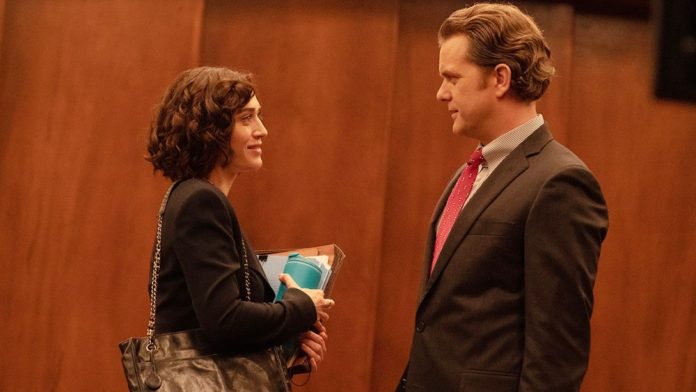It was 1987 when Fatal Attraction, a psychological thriller about a married attorney (Michael Douglas) whose one-night stand with a female colleague (Glenn Close) turns into a deadly obsession, became a huge box office success.
Fast forward 36 years later to 2023, where the context surrounding these two characters and their illicit affair has certainly changed, and Alexandra Cunningham (Dirty John, Dirty John: The Betty Broderick Story) had to up the ante as the showrunner/EP of the new Paramount Network series Fatal Attraction, which puts a fresh spin on the ’80s classic.
In Cuningham’s reimagining, Dan Gallagher (Joshua Jackson) has spent 15 years in prison for the murder of Alex Forrest (Lizzy Caplan), and the story jumps back and forth between flashbacks and the present day to unravel the mystery of her death, as Gallagher maintains his innocence and attempts to reconnect with his wife Beth (Amanda Peet) and daughter Ellen (Alyssa Jirrels).
Above the Line spoke with Alexandra Cunningham via Zoom from her home in Los Angeles, where sadly, her Labrador never interrupted our chat, even though she warned that it might happen. Cunningham’s other writing and producing credits include Desperate Housewives, HBO’s Rome, the Apple TV+ series Physical, and Bates Motel, and before we began our conversation, she described the artwork on the walls behind her, which entailed a drawing of the Bates Motel by caricaturist Al Hirschfeld, as well as a painting by Toby Huss, who plays investigator Mike Gerard in Fatal Attraction.
A crime-thriller aficionado, Cunningham thoughtfully discussed re-examining the movie’s themes for today’s audience, as the series explores how privilege plays a part in infidelity and what other societal factors may have contributed to Alex’s psychotic behavior. She also talked about how the film informed the series, which features several iconic nods to its predecessor, as well as what it was like working with a much-needed intimacy coordinator.
The following interview was conducted prior to the Writers Strike.
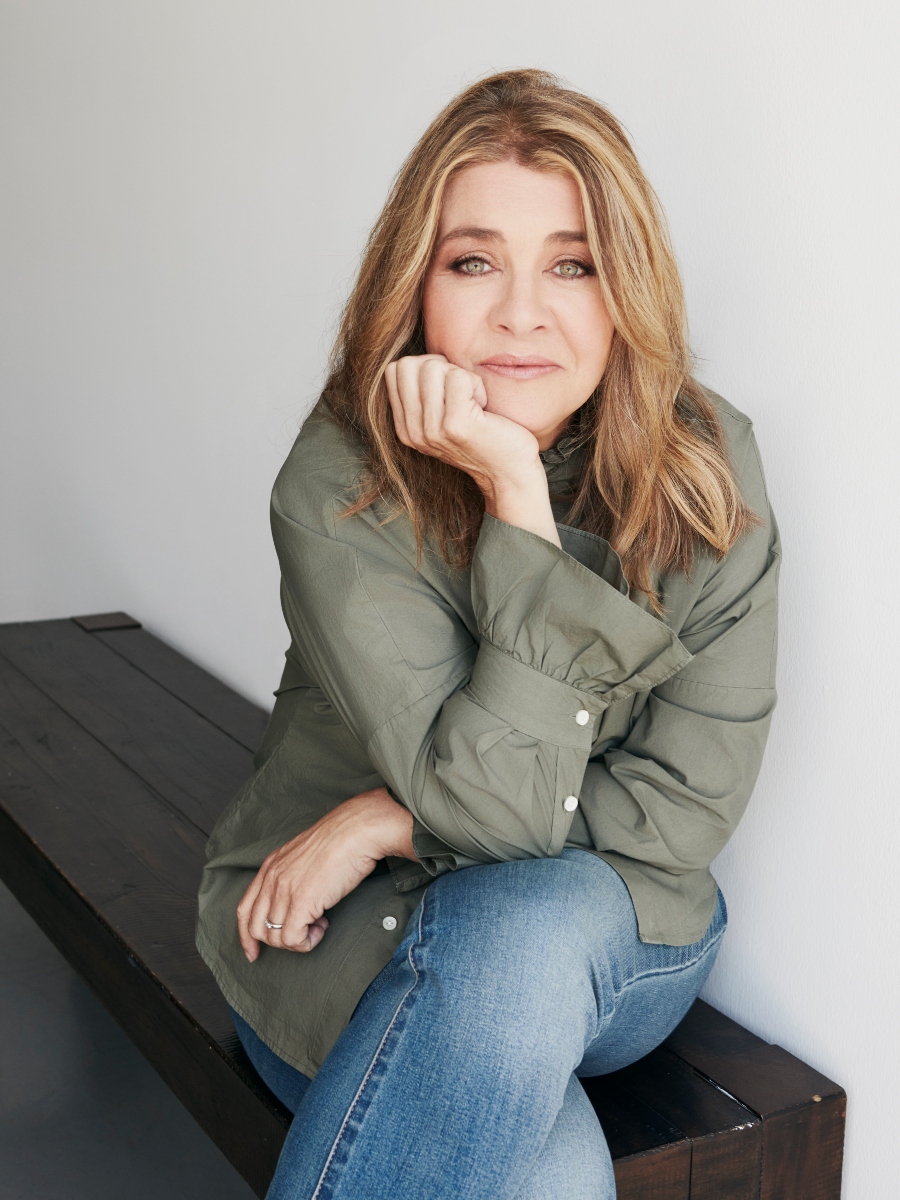
Above the Line: How did you first get involved with the Fatal Attraction series?
Alexandra Cunningham: I was lucky enough, I think, because on my resume I have things like Desperate Housewives and Dirty John and some heightened storytelling that people seem to respond to, so they thought, “We’ll ask her to do this.” I didn’t have to do any of the legwork that people ordinarily do to make their projects come together.
They called me, and I was going to say “no.” When they offered it, I was like, ‘Let me go think about that,’ already being like, “I’m going to give it just the sort of socially acceptable, however many days you can pretend you’re thinking,” just flop sweat terror at the idea. You know the film; it’s iconic. It just blew my mind. Who’s going to just be like, “What a great idea! Sure!”
ATL: Had you seen the original film?
Cunningham: I went away and watched the movie just for due diligence, just to make sure that I knew what I was going to say “no” to before I wrote the polite email. Then, of course, it sucks you in. Also, Lizzy [Caplan] says this thing, which is totally true, about how it’s not possible to watch the movie and have the experience that anyone had in the ’80s because we’ve all changed too much. Even people who saw the movie in theaters in the ’80s remember it. But I don’t remember seeing it.
Josh [Jackson] talks this way too; what I’m remembering is what we were all talking about, not the movie. Right? So you can’t watch it the same way because we’ve changed so much. When you watch it, you enjoy it because it’s great, but you also ask all kinds of questions that weren’t even part of the conversation back then, let alone things about privilege, power dynamics, personality disorders, and therapy. I kind of knew, because it scared me so much, that I should probably try to do my version of it.
ATL: What changed your mind and made you do the show?
Cunningham: When you’re watching something that is so iconic and terrific and at the same time, with your however many decades later headspace, you are looking at scenes and going, “Oh, if I were going to do that, I would write it this way,” or “I would write it so that this character in the movie who has no idea what’s going on maybe knows what’s going on, and what does that mean before the scene you saw and after the scene you saw?” Then all the luxuries that you have, when they’re going to give you eight, 10 or 13 hours to do something, where you can have plot but you can also have the thing that shows you who the person thinks they are when they’re going into that scene.
ATL: When you talk about the climate and how very different it is, especially in the wake of the #MeToo movement, I remember having the wonderful privilege of interviewing Michael Douglas when Fatal Attraction opened in theaters. I asked him about the sex scene, which he said was meticulously choreographed, down to the placement of his hand on the sink. How different were those kinds of conversations on your set?
Cunningham: I have no idea what that set was like. I’m going to assume that Glenn Close felt protected because she’s never said she didn’t. So this is not a criticism of that movie. It’s a criticism of, and I wasn’t in the business then, but when I did get into the business, I wasn’t an executive producer or anything, but if you were a person who maybe raised their hand and wanted to ask questions about that actor seeming uncomfortable, you were an obstructionist, right? You were holding up production if you wanted to be like, “Wait, should we go to the actor’s trailer and discuss with them the fact that maybe they didn’t know they were going to be taking their clothes off today?” It isn’t even a luxury because it’s a necessity that is now part of the process.
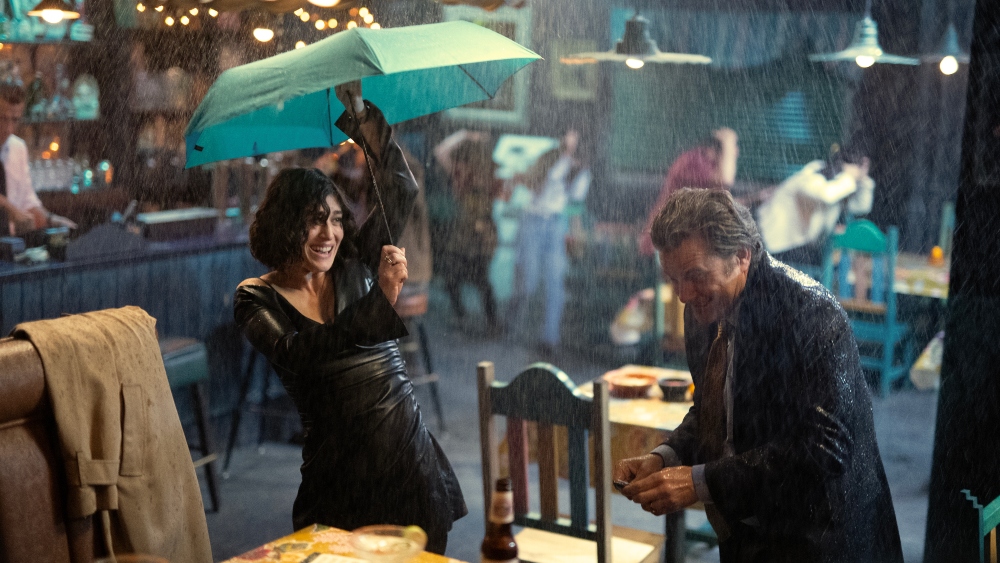
ATL: Obviously, you had an intimacy coordinator on this set though, right?
Cunningham: Thank God that we had an amazing intimacy coordinator (Nicole Randall), who actually used to be a stuntwoman. It’s great that you’re saying that Michael Douglas said it was choreographed within an inch of its life. That makes me happy because it makes me feel like it probably does resemble more the way we did it than, for instance, Last Tango in Paris.
We have a stuntwoman who, first of all, approaches everything like an action sequence. She’s dope. I’ve talked about her so much that I’m like, “Now I’ll never get to work with her again because every time I call her, she’ll be like, ‘I’m sorry, I’m already on this show.'” Hopefully, there are many people that she’ll train, and I know there’s now a program you can go to. So to your point, it’s like, “And then we turn 180 degrees and we go this way, you know? And then he picks her up, and then he puts his arm here,” you know?
There are long interviews with the actors beforehand. “What makes you comfortable? What makes you uncomfortable? What do you think is good about sex scenes on screen? What never works for you? What are you willing to do? What aren’t you willing to do? What parts of your body do you not like that you don’t want to show?” We talked about all that stuff. The actors knew we were going to hear what they said, and we wanted to hear what they said.
The way I wrote the script, knowing this was going to happen, was really just like, “And then they start kissing, and then they get into it.” Right? “And then they moved from the kitchen to the bed.” I was like, “We are going to all do this together.” I’m not going to write a thing where it’s like, “And then Dan touches her here.” What’s the point of that? I want the actors to participate. Josh and Lizzy have done these scenes before. Josh is a great protector of all of his colleagues, but especially Lizzy.
ATL: What do you remember about that day, and shooting those intimate scenes?
Cunningham: There was much discussion and so much choreography that when we started shooting, I basically was like, ‘I don’t need to be here so we can turn off all the monitors because no one needs to be watching this except for the people with the minis on set.’ So the crew that needs to be there is Nicole, the coordinator; Silver [Tree], the director; and the camera crew. That’s it.
No one needs to see what we’re doing because we don’t care if you don’t like it. It’s going to be erotic. We know our job description — we’re doing an erotic thriller. It’s going to be great. But this has been created by the people who are the most important in this situation, and so just knowing now that you can be like, “Well, that’s how it’s going to be. Don’t come by [the] set that day. Don’t have stills. Photographers, don’t decide to drop by. Anyone who’s on set can go home because I don’t want you watching it. Like, non-essential crew, you can go take a break.”
And to have everybody just be like, “Yep!” I’m so thrilled to have lived long enough to experience this moment, and I do not think it affects the eroticism of what’s on camera at all.
ATL: The other big difference is that this is a series, so tell me how you went about opening up the film and adapting it for the small screen.
Cunningham: Usually, when I sign on to do something and I’m pitching it, I will pitch the entire season upfront just so everybody’s kind of on the same page. As we start delivering the episodes, no one can go, “Oh, I didn’t know that was going to happen.” It doesn’t necessarily mean you love the execution, but you can’t say you were surprised because surprise, especially when you’re working on a schedule, is never good.
I brought my fellow EP, Kevin Hynes; we’ve done shows together before, and he was a criminal Assistant District Attorney in New York. In Los Angeles, we called him “Deputy.” And, you know, Dan’s (Joshua Jackson) a lawyer in the film, like an IP lawyer — somebody who would work with a publishing house on a case-by-case basis. So there was that element of it.
Then there is also the fact that at one point he goes to a police station because “my friend’s having trouble with a woman,” and the cops are kind of like, “Where is your friend? I’m not sure what we can do.”
Also, the fact that I love crime means that if I were writing Cast Away, a cop would show up somehow, just because I love cop shows and crime shows. Clearly, if you know anything about me, I wanted to kind of take this opportunity to make Dan a different kind of lawyer and to make him someone who’s kind of the king of his domain, so not only could we explore that kind of power dynamic with somebody who has run the world for a long time, but also to talk about how our justice system is broken, how it treats people with mental illness even when they’re the victim, and sort of the hypocrisy of that. It seemed like a great opportunity to explore all that.
Also, that way you can put in a murder mystery, [and] whenever you can put a murder mystery into something, I think you should! I’m addicted to that stuff.
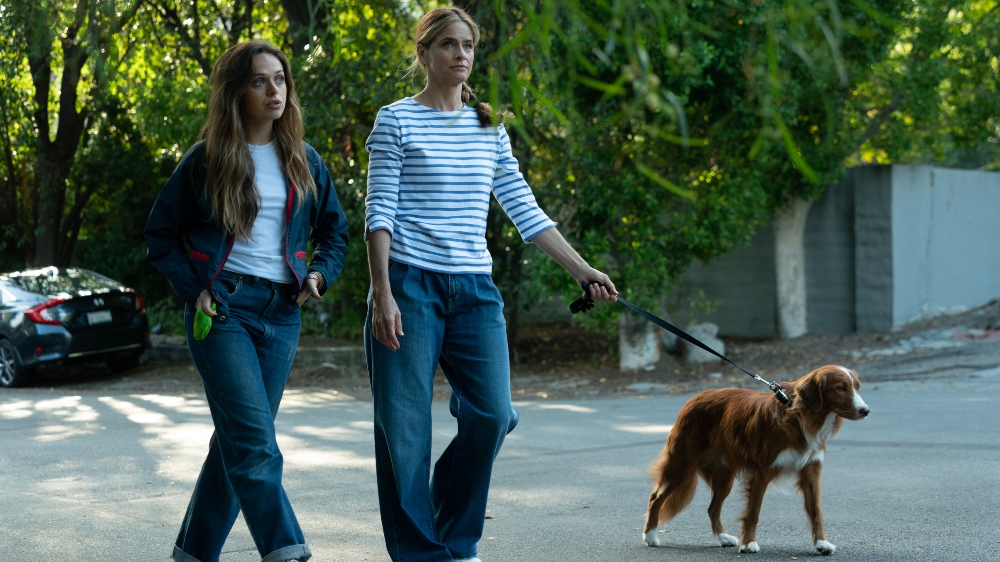
ATL: Let’s talk about casting. You got to reunite with Amanda Peet, who you worked with on Dirty John, and who plays Dan’s wife, Beth.
Cunningham: I never want to do a show without her again! It was funny because she knows everyone, and so when I was thinking about Beth, I only got a couple of hypothetical actors into the process. I’m like, “What do you think of this person? What do you think of that person?” And then suddenly I was like, “Wait a minute, is this weird that I haven’t asked you?” I don’t even know why I didn’t ask her. It’s so dumb in retrospect. Especially when watching the movie.
[There’s] an amazing scene… you watch Dan come home to find Alex in his apartment with Beth [and] pretending she’s going to buy it, when they’ve changed their phone number and she can’t [go] through anymore. Then, by the end of the scene, he comes in and is immediately reacted to by the energy in the room, and she’s toying with him. How is Beth not picking up on this? This is in no way a criticism of the iconic Anne Archer. She’s doing what the mission statement of the scene is, but, as a wife, I would be like, “There’s a vibe in here right now. This woman thinks my husband is cute.”
But I was like, “It would be so interesting to have that scene and then have it again with Beth informed. She’s picking up on the energy; she’s got more power and senses something’s going on with her husband, even if she doesn’t know what it is. When you have that character, no one’s ever going to put anything past Amanda Peet. So if you’re married to Amanda Peet, that immediately becomes a different proposition that’s more interesting to me, and Beth and Alex have a different dynamic that is interesting to me.
But Amanda can also do anything, and I love working with people who are such amazing comedians and making them do drama. It’s very enjoyable for me because it creates something unexpected, especially for their scene partners.
ATL: What was it about Lizzy Caplan that made her right for the character of Alexandra?
Cunningham: I had met Lizzy before anyone ever offered me this. She had actually reached out and asked to meet me after the first season of Dirty John because she was entertained by it. It was like an hour-long lunch that turned into a 10-hour lunch. Then I was like, ‘I’ve got to figure out how I can work with this person who is smart and funny, and you immediately feel comfortable with.’
She’s so real, she’s never pretentious, and her characters are always completely holistic. Even when she’s playing young Annie Wilkes and the physicality is Kathy Bates‘ physicality, You know, someone like that is who you need to sign on to take on an iconic part. She was almost like, ‘Is this what I’m going to do now? I’m going to take on parts that iconic actresses have made indelible?’ I’m like, ‘I think you’re an iconic actress, too.’
At the end of her career, she’ll look back at the EGOT (Emmy, Grammy, Oscar, and Tony). Going into it, I never wrote for actors. I mean, I write for Amanda now, but that’s a totally different situation, and I usually never write with actors in mind because I would limit myself. I would start tailoring, and that’s a mistake for me, [though] I did write this version of Alex with Lizzy in mind.
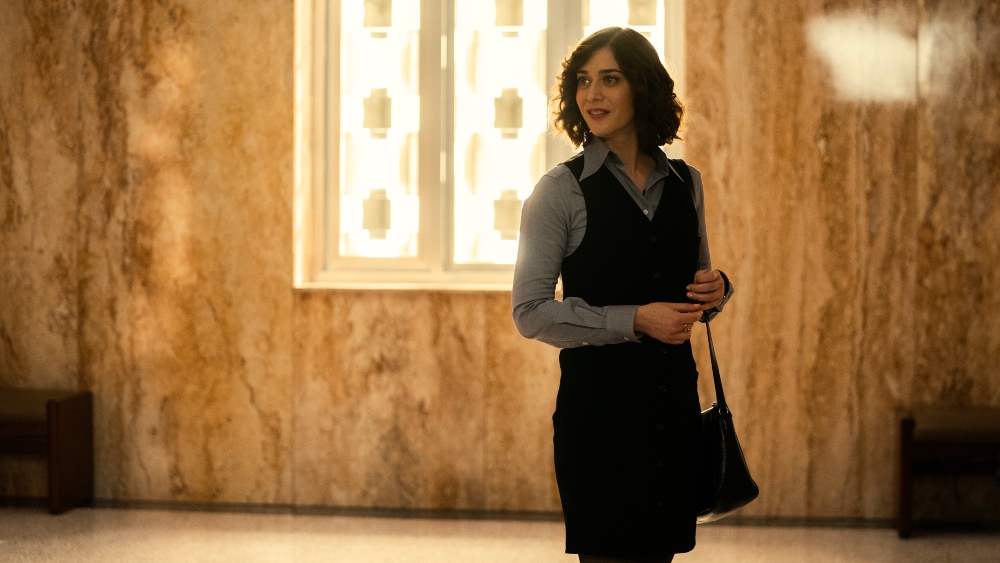
ATL: Casting the role of Dan, you had some pretty big shoes to fill considering Michael Douglas played the original part.
Cunningham: For Josh, when we did Dirty John: The Betty Broderick Story, our producing director, Maggie Kiley, was going into Dr. Death next (which starred Jackson). I had listened to the podcast. I was excited. I mean, that character is a real person who has never spoken about the horrific things he’s done or why, and so I was wondering what Josh would do with that. I thought he was a revelation. I’ve always been a fan of his, but that characterization was on another level.
So when the lists started coming in for who the studio network might be interested in, he was on that list. I was kind of like, “I could end this conversation right now.” Also, there is a Michael Douglas quality about him. Michael Douglas could do anything, and who is the Michael Douglas of today? There isn’t one; the biggest shoes are to be filled in a certain way. A well-known actor told me he would never take on an iconic Michael Douglas part. I have my own take on the icon of insecurity and stuff, but I’m not going to be on the poster on the bus going past you. Anyway, it was a dream casting him.
ATL: What were the challenges of having to age some of your actors over the course of the series?
Cunningham: Upfront, I said, ‘I think we need someone between the ages’ because, obviously, there was no universe where it was going to be one actor and then another actor. It was obviously going to be the [same] actors, except for the child, Ellen. Lizzie, we didn’t have to do that with, so it really was Josh and Amanda and Toby [Huss] and Reno [Wilson] and the people who span over the years.
Funnily enough, the reason I did that started with Ellen, [and] the idea of how this child has processed all this emotional violence that she [has] witnessed. In the ’80s, it was distinctly possible that her parents would be like, “Let’s never speak of this again, and she’ll forget about it.” Nobody kept the score; that book hadn’t been written yet. So wanting to see how she processed all of that and how she views and moves through the world, [and] wanting to see her as a young adult was what determined the timeline jump.
Then everyone else reaps the whirlwind of having to sit in age makeup. Our makeup department head, Cheri Montesanto, had come off Better Call Saul right before this, so she knows a little bit about people needing to look different ages. Cheri has so many tricks, like these tiny prosthetics, or this flap of skin that you’re carrying around. We couldn’t have done it without her.
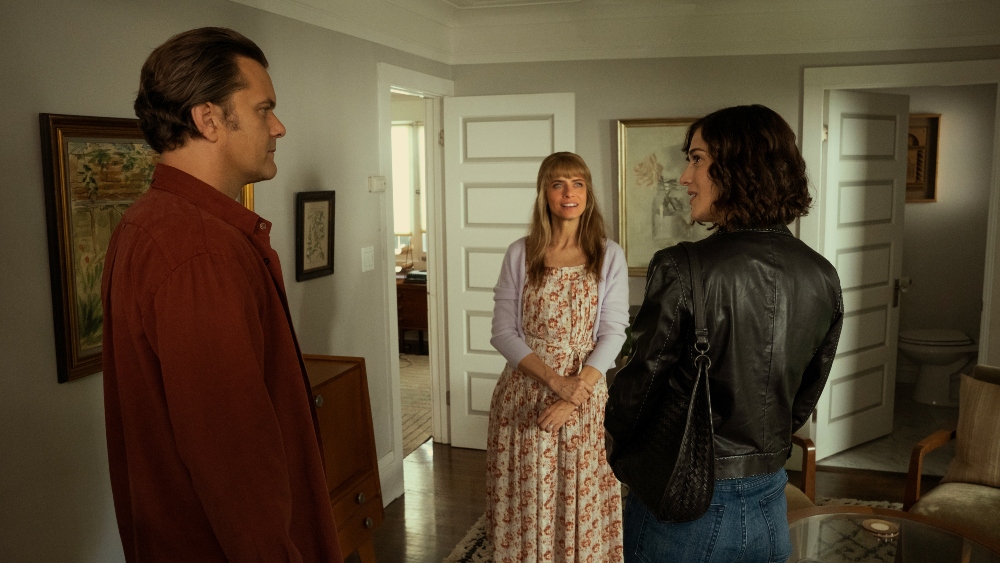
ATL: Who was your hair department head?
Cunningham: Our hair department head, Rick Caroto, is actually Glenn Close’s personal hair stylist of many years. He had worked with Josh on The Affair and with me and Amanda on Betty Broderick. Obviously, he was very important because Glenn had the most iconic hair. So many conversations were had way before Rick was technically paid because everybody was like, ‘We’ve got to really talk about this. You can’t just go in and put a very curly, very blonde wig on Lizzy and be like, “Here we are.” Are we going to try to do our own version of iconic hair? Are we going to nod to the iconic hair? Are we going to copy it?’
I didn’t want to do that, so what’s the nod? Is it blonde? Is it curly? Is it short? So many pictures of Lizzy in wigs were being sent to me, and she looked beautiful in all of them. It was a journey that you wanted to go on with your friends. That’s Lizzy’s hair. It’s just styled, and the curls are added for the exuberance of it, like the freedom of that hair. Like, that hair has a personality. It’s in your face. Being blonde wasn’t right for Lizzy, but it was also too much of the iconic original look because that is Glenn Close’s hair. The nod shouldn’t be to the blonde… it should be [to] the curls.
ATL: Speaking of iconic, how much back and forth was there before you decided to use the iconic line that Glenn Close says, “I’m not gonna be ignored, Dan!”
Cunningham: With everything we contemplate as an Easter egg, are we leaning into creative bankruptcy? Can we not come up with our own? But at the same time, we’re doing this out of a place of love and respect for the original, first of all. But we have that license to be able to include those things, and in a lot of cases, we try to include them organically in our storytelling, not just putting them in there for the sake of putting them in there.
But the line… yes. The line itself is iconic, I think, because of the way Glenn Close delivers it. It’s the execution. You can imagine another actor playing that, and it doesn’t stand out in the way that it does because of Glenn. I can see her in my head doing it. In that case, if it’s in the execution, let’s execute it again. Let’s give it a different context; let’s let Lizzy have it.
Like excitement, it’s heightened storytelling. I want to know what kind of woman says that to someone like that. In that sense, just love, respect, enjoyment, wanting to see Lizzy do it, [and] wanting to include it for people who loved it in the movie.
ATL: Do you think your series will inspire people to go back and rewatch the original film again, or inspire younger audiences to seek it out?
Cunningham: There are a lot of people who have never seen the movie. It’s amazing to me, and the age of some of them is what’s amazing to me. “How did you get away from that?” I want to know what questions everyone’s asking themselves now because it’s still such a fun ride. Really, it’s like a collective experience.
We all have to examine the culture in which you watched that movie, where at the end of it, people were screaming. The quote then was to “terminate the bitch with extreme prejudice.” What did that say about us? Has that changed? I hope so. That was kind of a goal of mine — to have people not say that about this version.
Fatal Attraction is now streaming on Paramount+.


